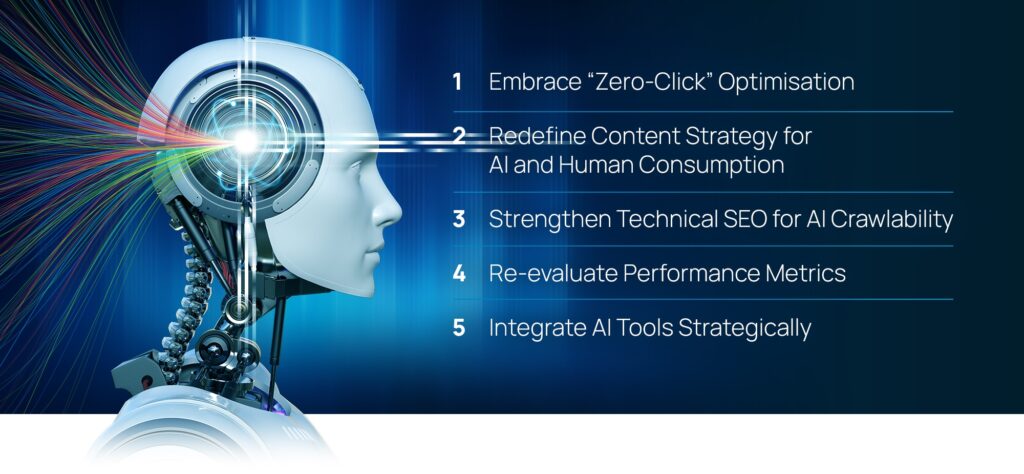For marketing directors, this isn’t merely an algorithmic tweak; it’s a fundamental shift in how users discover information, posing both significant challenges and unprecedented opportunities. The era of solely chasing traditional keyword rankings is rapidly receding, giving way to a more sophisticated, AI-centric approach.
The AI-Driven Evolution of Search
Google, Bing, and emerging AI-powered search engines are no longer just indexing keywords. Their algorithms, powered by Natural Language Processing (NLP) and machine learning, are increasingly adept at understanding user intent, contextual nuances, and even the sentiment behind a query. The most visible manifestation of this shift is the rise of “AI Overviews” (formerly SGE), generative AI summaries delivered directly on the Search Engine Results Page (SERP).
These AI Overviews, often pulling information from multiple sources, provide immediate answers, reducing the need for users to click through to websites. Data indicates that AI Overviews can significantly impact organic Click-Through Rates (CTRs), particularly for informational queries. While this might sound alarming, it underscores a critical point: the game is no longer just about appearing in search results, but about influencing the AI’s summary and securing visibility within these “zero-click” experiences.
Beyond AI Overviews, AI is influencing search in several profound ways:
· Deeper Understanding of User Intent: AI enables search engines to decipher the true intent behind a query, moving beyond mere keywords to understand the underlying question or need.
· Personalisation: Search results are increasingly tailored to individual user preferences, location, and past behavior.
· Multimodal Search: AI’s ability to interpret images, videos, and other media alongside text is enhancing visual and voice search capabilities.
· E-E-A-T (Experience, Expertise, Authoritativeness, Trustworthiness): AI algorithms are heavily reliant on these signals to determine content quality and credibility. Original research, proprietary data, and genuine human expertise are paramount.
· Content Volatility: Rankings within AI Overviews can be more volatile than traditional organic rankings, demanding continuous monitoring and adaptation.
Action Points for Marketing Directors
The seismic shifts in organic search necessitate a proactive and strategic response from marketing leadership. Here are key action points to ensure your brand remains visible, authoritative, and impactful in the AI-driven search era:
1. Embrace “Zero-Click” Optimisation:
· Focus on Featured Snippet & AI Overview Eligibility: Structure your content to provide clear, concise answers to common questions. Use headings, subheadings, bullet points, and lists to make content easily digestible for AI summarisation.
· Prioritise Direct Answers: Aim to answer questions directly and early in your content.
· Leverage Schema Markup: Implement structured data (schema markup) to provide explicit signals to search engines about the meaning and context of your content, increasing the likelihood of appearing in rich results and AI Overviews.
2. Redefine Your Content Strategy for AI & Human Consumption:
· Deep, Experiential Content: AI excels at summarisation, but it struggles with original research, unique perspectives, and deep, experience-driven insights. Invest in content that showcases your brand’s unique expertise and offers genuine value beyond what an AI can generate.
· Topical Authority over Keyword Stuffing: Build deep topical authority by creating comprehensive content clusters around core themes, rather than obsessing over individual keywords.
· Conversational & Long-Tail Keywords: Optimise for natural language and long-tail, question-based queries that align with how users speak to AI assistants and search engines.
· Diversify Content Formats: Go beyond text. Invest in high-quality video, infographics, interactive tools, and audio content, optimising them with relevant alt text, captions, and structured data.
· Originality and E-E-A-T: Emphasise the “Experience” in E-E-A-T. Showcase your team’s expertise, cite first-hand experiences, and ensure content is accurate, trustworthy, and comes from authoritative sources. Google is actively penalising scaled, low-quality AI-generated content.
3. Strengthen Technical SEO for AI Crawlability:
· Clean Site Architecture: Ensure your website has a clean, well-organised structure that is easily crawlable by AI bots.
· Mobile-First & Page Speed: Maintain excellent mobile responsiveness and fast page loading speeds, as these remain critical ranking factors and contribute to a positive user experience.
· Experiment with AI Crawler Directives: Explore emerging tools and directives like llms.txt (if applicable) to guide AI crawlers and help them better understand your content.
4. Re-evaluate Performance Metrics:
· Beyond Clicks: While organic traffic remains important, expand your measurement to include impressions within AI Overviews, brand mentions within AI responses, and the influence your content has on user decision-making, even without a direct click.
· Conversion and Engagement: Focus on metrics that indicate genuine engagement and conversion, such as dwell time, bounce rate, and lead quality, rather than solely on raw organic traffic numbers.
· AI-Driven Analytics: Leverage AI-powered analytics tools to gain deeper, real-time insights into user behaviour and to anticipate search trends.
5. Integrate AI Tools Strategically:
· AI-Assisted, Not AI-Generated: Use AI tools (e.g., ChatGPT, Gemini, Semrush, Ahrefs, SurferSEO) for efficiency in keyword research, content ideation, outlining, and optimisation suggestions. However, insist on human oversight and refinement to ensure originality, accuracy, and brand voice.
· Predictive Analytics: Utilise AI for forecasting search trends and identifying emerging keyword opportunities before the competition.
The AI revolution in organic search is not a threat to be feared, but a powerful catalyst for innovation. Marketing directors who embrace these changes, prioritise genuine value, and adapt their strategies with foresight will be well-positioned to thrive in this new, intelligent search landscape. The future of organic search belongs to those who understand that in a world of AI, human expertise, authenticity, and a relentless focus on user value are more critical than ever.
